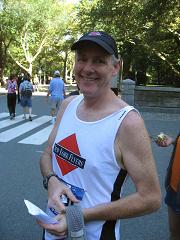This raises 2 questions:
- What, if anything, will the B.A.A. change for next year?
- How what effect will this have on the broader running community?
In this video, Guy Morse of the B.A.A. makes it clear that they are considering all options:
Here are the options that I can think of:
- Do nothing. Many hot ticket events work this way -- first come, first served. (yuck!)
- Tighten the qualifying standards (including limiting the time window).
- Increase the field.
- Institute a lottery.
Boston has a lot of prestige in the marathoning world for a number of reasons; it is the oldest U.S. marathon, it is run very smoothly, has a great course and... it has qualifying standards.
The qualifying standards are Boston's defining feature for many of the runners I know, but I'm not sure that the B.A.A. sees it the same way.
If they don't tighten the qualifying times, it will be interesting to see if other marathons try to take Boston's place for qualifying prestige. Last year, the Exeter Marathon ran it's first race with 54 finishers. This race has tougher qualifying times than Boston, and no other way to gain entry. This year, rebranded as the Gansett Marathon, it will certainly grow. On their Facebook page, they reported 3500 hits on their website in the 2 days after Boston closed.
My guess is that other, bigger marathons will notice Monday's blitz, and market themselves with qualifying times. As more and more people take up running, these organizations will come to see qualifying times not as a way to restrict the field, but as a way to promote an event.
At any rate, it seems clear that marathoners are both increasing in numbers and getting more interested in performance. All good in my book.




